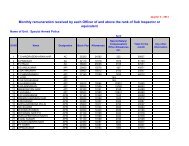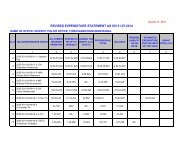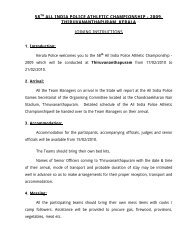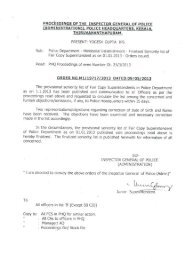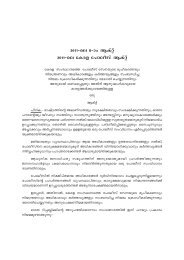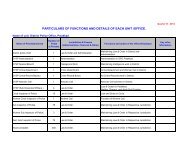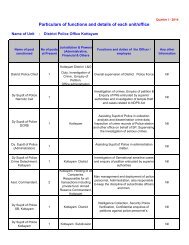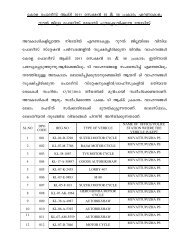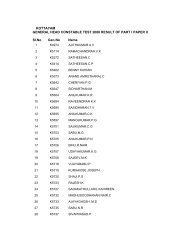Police Act 2008 - Kerala Police
Police Act 2008 - Kerala Police
Police Act 2008 - Kerala Police
Create successful ePaper yourself
Turn your PDF publications into a flip-book with our unique Google optimized e-Paper software.
Party interface is creating practical problems throughout India, leading<br />
many good persons to condemn political control and praise rigid,<br />
bureaucratic controls, which would be unresponsive to popular will, over<br />
the <strong>Police</strong>. This tendency has gained popularity primarily because the<br />
existing 1861 model is incapable of harmoniously integrating the conflicting<br />
pressures which are natural in a democracy.<br />
As always, <strong>Kerala</strong> was the first Indian State to discover, and formulate<br />
a response to, the contradiction implicit in trying to a police a democracy<br />
with a system perfected for ensuring colonial subjugation. How can the<br />
same <strong>Police</strong> which meticulously subjugated public freedoms now become<br />
the guardians of public freedoms and ensure that citizens peacefully enjoy<br />
every freedom and every right guaranteed to them under the constitution<br />
In 1959, a <strong>Police</strong> Reorganisation Committee under Sri N.C. Chatterjee was<br />
asked to look into this, but its valuable report did not lead to any positive<br />
action.<br />
In the years that followed, the calls for police reform have become<br />
more strident. The National <strong>Police</strong> Commission of 1977 gave its landmark<br />
report but the inertia of the system prevented any dynamic action. As<br />
problems continued, several States and the Centre appointed myriad<br />
Commissions and Committees to look into issues related to <strong>Police</strong> Reform.<br />
And every enlightened person has come to the inescapable conclusion that<br />
reforming the police has become imperative if democracy is to survive, both<br />
as system of governance and as a way of life.<br />
This is the background against which the Government of <strong>Kerala</strong><br />
decided in August 2006 to formulate a new <strong>Police</strong> <strong>Act</strong>. Shortly afterwards<br />
the Honourable Supreme Court also directed urgent action with regard to a<br />
few salient aspects.<br />
The <strong>Kerala</strong> of today bears no semblance to the India of 1861. It is not<br />
only the system of governance but also the entire social spectrum that has<br />
undergone unbelievable changes. <strong>Kerala</strong> then had no motor vehicles, no<br />
phones, no radio, no television, no airports, no railway, no popular<br />
newspapers, no political parties, no civic freedoms, - and only rudimentary<br />
systems of education, health, tourism or industry! And we still have the<br />
same <strong>Police</strong> <strong>Act</strong>!<br />
A new <strong>Police</strong> <strong>Act</strong> must also take note of these vast changes that have<br />
taken place in <strong>Kerala</strong> society since the 1861 <strong>Act</strong> was formulated. This is<br />
because policing is influenced not only by the system of governance but also<br />
4



